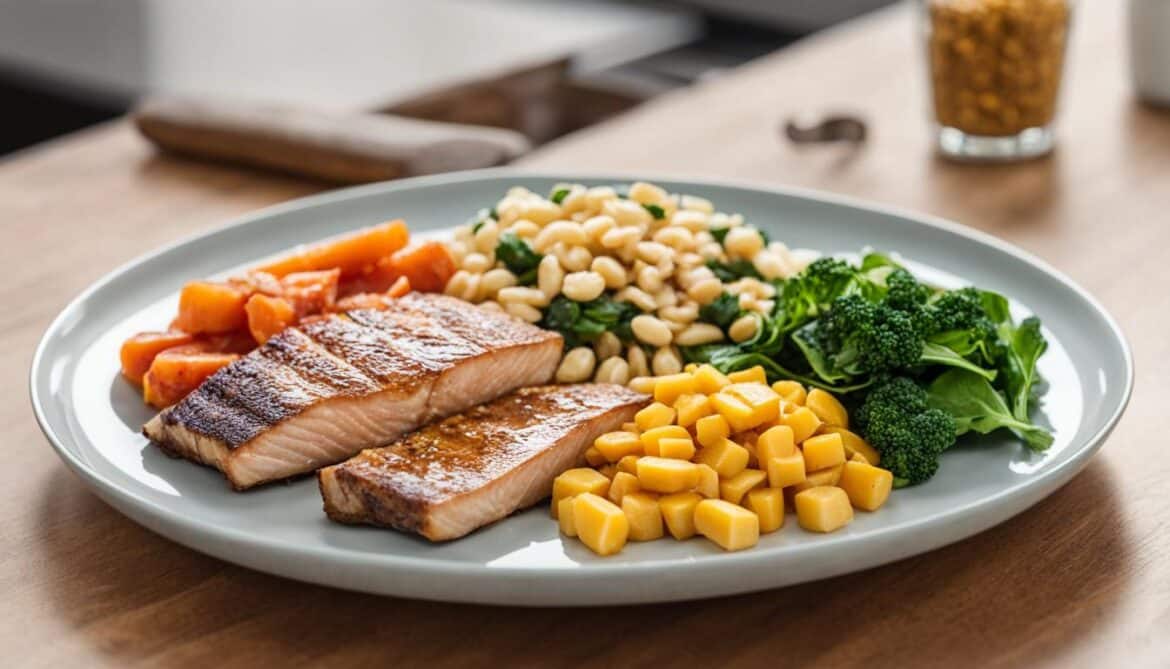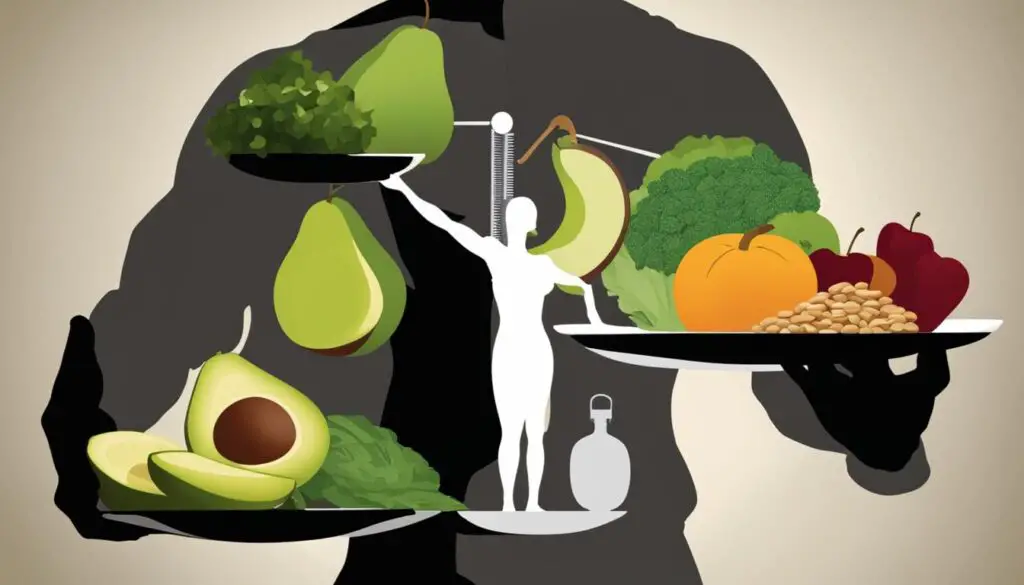When it comes to weight loss, creating a meal plan that balances macronutrients is essential. By understanding the role of carbohydrates, proteins, and fats in your diet, you can optimize your nutrient intake and achieve your weight loss goals effectively. With the right balance, you can fuel your body, control hunger cues, and support overall health.
Key Takeaways:
- Understanding the role of macronutrients—carbohydrates, proteins, and fats—is crucial for creating a successful weight loss meal plan.
- Carbohydrates provide fuel for the body and should be sourced from whole grains, fruits, and vegetables.
- Proteins help build and repair tissues, boost metabolism, and increase satiety—lean sources include chicken, fish, tofu, and legumes.
- Fats play a key role in hormone production, nutrient absorption, and satiety—healthy sources include avocados, nuts, seeds, and olive oil.
- A balanced weight loss meal plan typically consists of approximately 40% carbohydrates, 30% protein, and 30% fats.
Understanding Macronutrients and Their Importance
Macronutrients are the three main types of nutrients that provide energy to the body: carbohydrates, proteins, and fats. Each macronutrient serves a unique purpose and plays a critical role in maintaining optimal health, promoting weight loss, and supporting muscle development.
Carbohydrates are the body’s primary energy source. They are found in foods such as grains, fruits, and vegetables. When consumed, carbohydrates are broken down into glucose, which fuels our cells and provides energy for physical activity. Including the right amount of carbohydrates in your weight loss meal plan is crucial for maintaining stable energy levels and supporting overall well-being.
Proteins are essential for building and repairing tissues. They are made up of amino acids, which are the building blocks of our body. Protein-rich foods include meat, fish, dairy products, legumes, and tofu. Adequate protein intake is important for preserving muscle mass, boosting metabolism, and increasing satiety. By incorporating lean sources of protein into your weight loss meal plan, you can support fat loss while maintaining muscle health.
Fats play a key role in hormone production, nutrient absorption, and cellular function. Healthy fats, such as those found in avocados, nuts, seeds, and olive oil, provide essential fatty acids and fat-soluble vitamins. Contrary to popular belief, including a moderate amount of healthy fats in your weight loss meal plan can actually promote satiety and aid in the absorption of fat-soluble nutrients. Finding a balance between different types of fats is important for overall health and weight management.
Each macronutrient has a specific calorie value, and understanding the importance of each can help you design a weight loss meal plan that aligns with your goals. By striking the right balance between carbohydrates, proteins, and fats, you can optimize your nutrient intake and achieve sustainable weight loss.
“By striking the right balance between carbohydrates, proteins, and fats, you can optimize your nutrient intake and achieve sustainable weight loss.”
The Role of Carbohydrates in Weight Loss
Carbohydrates often receive a bad rap when it comes to weight loss, but they are an essential part of a balanced diet. According to nutrition experts, carbohydrates provide fuel for the body and brain, supporting overall health and vitality.
However, it’s important to note that not all carbohydrates are created equal. While complex carbohydrates, such as whole grains, fruits, and vegetables, provide sustained energy and essential fiber, simple carbohydrates, found in sugary snacks and refined grains, can lead to spikes in blood sugar levels and cravings.
So, how do carbohydrates contribute to weight loss? By including the right balance of carbohydrates in your meal plan, you can maintain stable energy levels, promote satiety, and support your weight loss goals. Complex carbohydrates take longer to digest, providing a steady release of energy and helping you feel fuller for longer periods of time.
Here’s a breakdown of the types of carbohydrates to include in your weight loss meal plan:
- Complex carbohydrates: Whole grains (such as quinoa, brown rice, and whole wheat), fruits (such as berries and apples), and vegetables (such as broccoli and spinach).
- Simple carbohydrates: Limit consumption of sugary snacks, processed foods, and refined grains (such as white bread and white rice).
Benefits of including complex carbohydrates:
Incorporating complex carbohydrates into your weight loss meal plan offers several benefits:
- Sustained energy: Complex carbohydrates provide a steady release of energy, keeping you fueled throughout the day and supporting your weight loss efforts.
- Fiber content: Whole grains, fruits, and vegetables are rich in dietary fiber, promoting digestive health, and helping you feel fuller for longer.
- Nutrient density: Complex carbohydrates are packed with essential vitamins, minerals, and antioxidants, supporting overall health and well-being.
By prioritizing complex carbohydrates and avoiding excessive consumption of simple carbohydrates, you can create a weight loss meal plan that supports your goals while providing the necessary nutrients for optimal health.
| Complex Carbohydrates | Simple Carbohydrates |
|---|---|
| Whole grains (quinoa, brown rice, whole wheat) | Sugary snacks |
| Fruits (berries, apples) | Processed foods |
| Vegetables (broccoli, spinach) | Refined grains (white bread, white rice) |
The Importance of Protein in Weight Loss
When it comes to weight loss, protein plays a crucial role in achieving your goals. Not only does it help build and repair muscles, but it also boosts metabolism and increases satiety. Including lean sources of protein in your weight loss meal plan can help preserve muscle mass while promoting fat loss.
Lean sources of protein include chicken, fish, tofu, and legumes. These protein-rich foods are not only nutritious but also filling, making them an excellent choice for weight loss. By incorporating these foods into your diet, you can ensure that your body gets the protein it needs without excess calories.
“Increasing your protein intake has been shown to reduce cravings and improve body composition,”
Including protein in your weight loss meal plan also helps regulate hunger and control cravings. Protein takes longer to digest, which means it keeps you feeling full for longer periods. This can prevent you from overeating and make it easier to stick to your calorie goals.
The Benefits of Protein in Weight Loss:
- Builds and repairs muscles
- Boosts metabolism
- Increases satiety
- Reduces cravings
- Improves body composition
When incorporating protein into your weight loss meal plan, it’s essential to balance it with other macronutrients. A well-rounded meal plan should also include carbohydrates and healthy fats to ensure you’re getting a variety of nutrients and supporting overall health and well-being.
By focusing on the right balance of macronutrients and making smart food choices, you can harness the power of protein to enhance your weight loss journey and achieve your desired results.
The Role of Fats in Weight Loss
Despite their bad reputation, fats are an essential part of a balanced diet and play a crucial role in weight loss. Incorporating healthy fats into your weight loss meal plan can actually help you achieve your goals more effectively.
Healthy fats, such as avocados, nuts, seeds, and olive oil, provide essential fatty acids and fat-soluble vitamins. These nutrients are vital for overall health and well-being. They also contribute to satiety, keeping you feeling satisfied and reducing the risk of overeating.
One of the key benefits of healthy fats is their ability to slow down digestion. This means that when you consume fats, your body takes longer to break them down, resulting in a slower release of energy. This steady energy release helps you feel fuller for longer and prevents cravings and energy crashes.
Furthermore, fats play a critical role in nutrient absorption. Many vitamins and minerals are fat-soluble, meaning they can only be absorbed and utilized by the body in the presence of fat. By including healthy fats in your meals, you ensure that your body is able to properly absorb and utilize these essential nutrients.
Moreover, healthy fats are important for maintaining hormonal balance. Fats are involved in the production of hormones that regulate various bodily processes, including metabolism, appetite, and mood. By including a moderate amount of healthy fats in your weight loss meal plan, you support the optimal functioning of these hormones, which can positively impact your weight loss journey.
Incorporating healthy fats into your weight loss meal plan can promote satiety, improve nutrient absorption, and support hormonal balance, making it an essential component of a successful weight loss strategy.
Creating a Balanced Weight Loss Meal Plan
To create a balanced weight loss meal plan, it’s important to consider the appropriate portions and ratios of macronutrients. When designing your meal plan, aim for a distribution of approximately 40% carbohydrates, 30% protein, and 30% fats, as suggested by First source:. However, it’s crucial to note that individual needs may vary, and seeking personalized guidance from a registered dietitian or nutritionist is advisable. They can provide tailored recommendations based on your specific goals and requirements.
When structuring your weight loss meal plan, focus on incorporating whole, nutrient-dense foods that provide essential vitamins, minerals, and antioxidants. Include a variety of fruits, vegetables, lean proteins, and healthy fats to ensure a well-rounded and balanced diet. This approach not only supports weight loss but also promotes overall well-being and optimal health.
Sample Balanced Weight Loss Meal Plan
Here’s an example of a balanced weight loss meal plan for a day:
| Meal | Menu |
|---|---|
| Breakfast |
|
| Lunch |
|
| Afternoon Snack |
|
| Dinner |
|
| Evening Snack |
|
Remember, this is just a sample meal plan, and it’s essential to customize it according to your preferences, dietary restrictions, and goals. This meal plan emphasizes the inclusion of whole, nutrient-dense foods, and balanced macronutrient proportions to support healthy weight loss. Keep in mind that portion sizes should be adjusted based on individual calorie needs and activity levels.
By following a balanced weight loss meal plan, you can ensure that you’re getting the right nutrients while creating a calorie deficit for weight loss. Consultation with a healthcare professional or registered dietitian can provide you with personalized guidance, leading you towards achieving your desired weight loss goals.
Conclusion
Optimizing your nutrient intake, promoting weight loss, and improving overall health are key goals when creating a weight loss meal plan. Balancing macronutrients, namely carbohydrates, proteins, and fats, is essential in achieving these objectives. By understanding the role of each macronutrient and its impact on your body, you can design a meal plan that fits your individual needs and supports your weight loss journey.
Find Your Balance
When it comes to macronutrient balance, it’s important to listen to your body and make mindful food choices. A well-rounded weight loss meal plan should include a variety of nutrient-dense foods, such as whole grains, lean proteins, fruits, vegetables, and healthy fats. Strive to create a meal plan that consists of approximately 40% carbohydrates, 30% protein, and 30% fats, but remember that individual needs may vary. Consulting with a registered dietitian or nutritionist can provide personalized guidance, ensuring that your meal plan aligns with your specific goals and health requirements.
Achieve Success on Your Weight Loss Journey
Transforming your diet strategy and achieving your weight loss goals is within reach with a balanced macronutrient intake. By prioritizing proper nutrition, you can optimize your body’s performance, regulate blood sugar levels, control hunger cues, and enhance energy levels. Remember to approach your weight loss journey holistically, incorporating other lifestyle factors such as regular physical activity, adequate sleep, and stress management. Combining these elements with a well-balanced meal plan can set you up for long-term success in achieving and maintaining a healthy weight.
FAQ
Why is balancing macronutrients important for weight loss meal plans?
Balancing macronutrients is crucial for creating an effective weight loss meal plan. By understanding the role of carbohydrates, proteins, and fats in your diet, you can optimize your nutrient intake, promote weight loss, and improve your overall health.
What are macronutrients and why are they important?
Macronutrients are the three main types of nutrients that provide energy to the body: carbohydrates, proteins, and fats. Carbohydrates are the body’s primary energy source, proteins are essential for building and repairing tissues, and fats play a key role in hormone production and nutrient absorption. Achieving the right balance of macronutrients in your weight loss meal plan is essential for maintaining optimal health, promoting weight loss, and supporting muscle development.
How do carbohydrates affect weight loss?
Carbohydrates provide fuel for the body and brain. Complex carbohydrates, such as whole grains, fruits, and vegetables, provide sustained energy and fiber, while simple carbohydrates, like sugary snacks and refined grains, can lead to spikes in blood sugar levels and cravings. Finding the right balance of carbohydrates in your weight loss meal plan is crucial for maintaining stable energy levels and promoting satiety.
What is the importance of protein in weight loss?
Protein plays a vital role in weight loss as it helps to build and repair muscles, boosts metabolism, and increases satiety. Including lean sources of protein, such as chicken, fish, tofu, and legumes, in your weight loss meal plan can help preserve muscle mass while promoting fat loss. Increasing protein intake has been shown to reduce cravings and improve body composition.
Are fats important for weight loss?
Despite their bad reputation, fats are an essential part of a balanced diet and play a crucial role in weight loss. Healthy fats, such as avocados, nuts, seeds, and olive oil, provide essential fatty acids and fat-soluble vitamins. They also help slow down digestion, keeping you feeling satisfied and reducing the risk of overeating. Incorporating a moderate amount of healthy fats into your weight loss meal plan can promote satiety, improve nutrient absorption, and support hormonal balance.
How can I create a balanced weight loss meal plan?
To create a balanced weight loss meal plan, it’s important to consider the appropriate portions and ratios of macronutrients. Aim for a meal plan that consists of approximately 40% carbohydrates, 30% protein, and 30% fats. However, individual needs may vary, and it’s advisable to consult with a registered dietitian or nutritionist for personalized guidance. By focusing on whole, nutrient-dense foods and incorporating a variety of fruits, vegetables, lean proteins, and healthy fats, you can create a meal plan that supports your weight loss goals and overall well-being.
Why should I balance macronutrients in my weight loss meal plan?
Balancing macronutrients in your weight loss meal plan is crucial for optimizing your nutrient intake, promoting weight loss, and improving overall health. By understanding the role of carbohydrates, proteins, and fats and creating a balanced meal plan that suits your individual needs, you can set yourself up for success on your weight loss journey. Remember to listen to your body, make mindful food choices, and seek professional guidance if needed. With a balanced macronutrient intake, you can transform your diet strategy and achieve your weight loss goals effectively.



